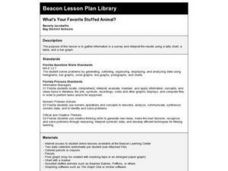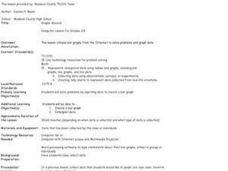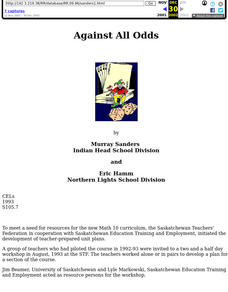Curated OER
Range and Measures of Central Tendency
Third graders take notes on a PowerPoint presentation featuring calculating and analyzing data. They practice skills highlighted in the presentation and create a table in Microsoft Excel showing data analysis.
Curated OER
Linear Progression
Learners use graphing calculators to graph lines and create tables of values. They perform an experiment using M&M's and slinkys, then create their tables based on their results.
Curated OER
Letter Patterns
Second graders look at the number patterns we get from letters and numbers. They keep track of the numbers involved by drawing up a table of values. It's important here to look for the pattern and see how the number of tiles changes from...
Curated OER
Odd Thing Out
Young scholars listen to the math problem provided and work in groups to solve. They think about the objects and write down their information in a table. Class construct the table on a large piece of paper that can be put on the wall...
Curated OER
Poppy Meets Pythagoras
Eighth graders find connections between numbers in a table; use Pythagoras' theorem in a general algebraic form; and measure accurately from a scale drawing to find a method that might enable the helicopter to land inside a rectangular...
Curated OER
Graphs And Ellipses
High schoolers become acquainted with linear graphs, the parabola and the rectangular hyperbola. Also prepare tables of paired values as preparation for plotting a line. They study the cartesian equation of an ellipse, with a worked...
Curated OER
Using 3-D Models for Code Validation with FoilSim
Students use FoilSim to complete the activity to create tables of data sets comparing the lift values for a 3-D model of a symmetrical wing section to the values predicted by the FoilSim software.
Curated OER
What's Your Favorite Stuffed Animal?
Second graders gather information in a survey and interpret the results using a tally chart, a table, and a bar graph. They' present their results of the during the final group discussion. The subject of the survey is favorite stuffed...
Curated OER
You Gotta Have Heart
Ninth graders investigate the concept of relations and interpret graphs and tables. They analyze given data and look for a pattern to determine if the numbers represent a function. Students practice solving scientific word problems that...
Curated OER
Checking County Numbers
Students use their county's information page to gather information about their community. Using the information, they create graphs from the tables provided and interpret the data. They write a paragraph showing their interpretation of...
Curated OER
Graphs Abound
Young scholars create a survey for their classmates to collect data on their favorite foods, eye color, pets or other categorical data. They compile the data from the survey in a table and then make a bar graph of each category using a...
Curated OER
Deci-order
Fourth graders play a game to practice their decimal number ordering skills. They use their knowledge of the number system to create the biggest decimal number. Students are dealt 3 cards each with the reminaing cards placed face down...
Curated OER
Exploring Number
Students complete activities to study the number 5 and the concept of fiveness. In this number recognition lesson, students recite finger rhymes and participate in activities to learn about the number 5. Students complete a related...
Curated OER
Guess the Month Trick
In this math card trick activity, students follow the directions and learn how to perform a card trick in which the correct month is guessed. Students use a Base 2 arithmetic system.
Pennsylvania Department of Education
Multiple Patterns
Students explore patterns that involve doubling numbers. In this multiple patterns lesson, students use objects to explore these patterns while recording them using a table. Students recognize even and odd number patterns while applying...
Curated OER
Against all Odds
Tenth graders appreciate the role of probability in understanding everyday situations. They Communicate a summary of financial projections in appropriate reports, tables, and graphs after creating a new game of chance.
Curated OER
the Squares of Numbers in Multiplication
Young scholars memorize the multiplication math facts and learn many different ways of visualizing and practicing the multiplication concepts. They begin practicing with arrays, skip counting, and moving manipulatives for the 0, 1, 2, 3,...
Curated OER
Jumping Multiples
Fourth graders practice their multiplication facts by using jump ropes and incorporating math into physical education. They use their jump ropes to jump the product of the multiples that the teacher calls out.
Curated OER
ng Data: Probability, What's in the bag?
Students use the language associated with probability to discuss events including those with equally likely outcome. They collect data from a simple experiment and record in a frequency table: estimate probabilities based on this data
Curated OER
Worms and more
Students have early length experiences must develop an awareness of what length is, and of the range of words that can be used to discuss length. Young children usually begin by describing the size of objects as big and small. They...
Curated OER
Decimals in the Garden
In this math worksheet, students are given pictures of garden tools and prices (in pounds). They select the items they would like to purchase for their garden and calculate the cost to buy these items. Students may use the internet to...
Curated OER
Sweethearts and Data Analysis
Learners explore the concept collecting and representing data. In this collecting and representing data lesson plan, students record the different colors of sweetheart candies in their sweethearts box. Learners create a table of the data...
Curated OER
Trade Missions
Students research the products of countries in Central and South America. t research which products from the countries they represent are imported to the United States. They create tables and/or graphs to indicate annual totals.
Curated OER
Supermarket Displays
Second graders look at the number patterns created when cans are stacked in different arrangements. The aim of the unit is for students to keep track of the numbers involved by drawing up a table of values. They are then encouraged to...

























